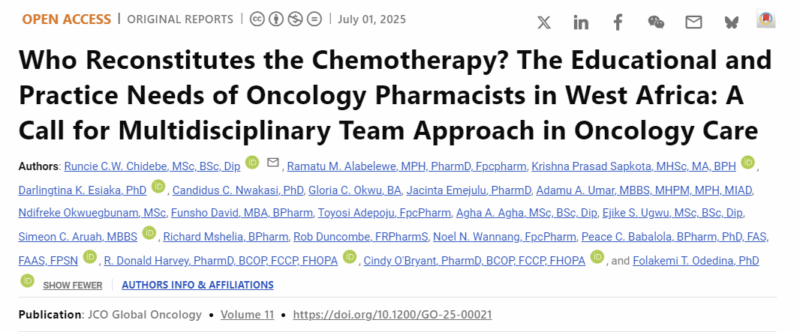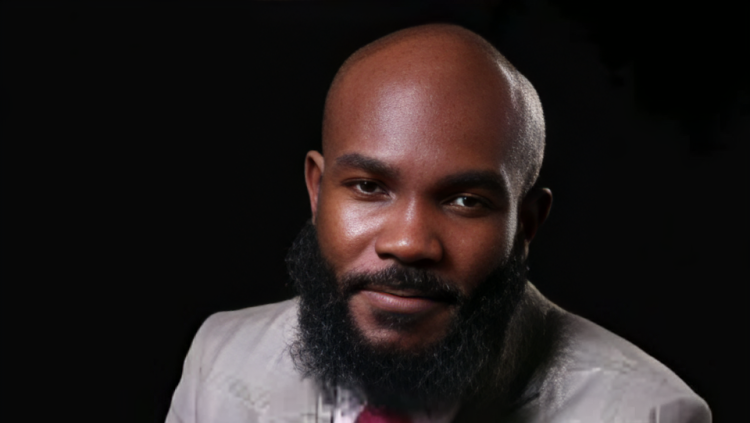Runcie Chidebe, Executive Director of Project PINK BLUE, shared a post on LinkedIn about recent article he and his colleagues co-authored, adding:
“I’m super excited that the first publication from Project PINK BLUE’s Upgrade Oncology Pharmacy is now available.
As we already know, the shrinking oncology workforce is one of the most significant challenges to accessing care and treatment in Nigeria and across West Africa. One of the most important oncology professionals is the oncology pharmacist; however, they are largely neglected and underutilised in oncology care and treatment.
In this study, we explored the educational and practice needs of oncology pharmacists (OPs) in Nigeria and West Africa.
Our findings showed that:
- Only 54% of OPs were responsible for chemotherapy reconstitution
- Only 60% of the oncology centers in Nigeria had a biosafety cabinet.
- Only six biosafety cabinets and reconstitution rooms were functional in the country.
- 91% of OPs were practicing; however, only 54% were trained in OP.
- Most of the OPs spent time weekly on reconstitution, administrative duties, teaching, and training
- Only 3% spent time on oncology clinical trials and conferences and 8% on noninterventional research.
Clearly, most oncology pharmacists are excluded from chemotherapy reconstitution in many centers, and multidisciplinary team practices are limited. We argue that the OPs should be included in all oncology practices in the region; this will not only increase MDT but will also reduce clinical workload on the clinical oncologists.
The absence of biosafety cabinets (BSCs) in some chemotherapy centers is worrisome and problematic in Nigeria. This is against the recommendations of the International Society of Oncology Pharmacy Practitioners (ISOPP) and the FMoH Chemosafe policy.
Unprotected exposure to antineoplastic drugs (ie, anticancer drugs) has been linked to adverse reproductive effects, miscarriages in female nurses, and infertility. We argue that the FMOH, the National Institute for Cancer Research and Treatment, and other health agencies in West Africa must urgently establish a national and state task force to monitor all chemotherapy centers and enforce BSC in reconstitution. This task force should also ensure that those preparing chemotherapy to treat cancer patients are protected from carcinogens.
In the short term, specialized training in chemotherapy reconstitution, safe handling, and clinical trials is needed; in the long term, a fellowship in oncology pharmacy is urgently needed.
Thanks to U.S. Mission Nigeria, The Fulbright Program, U.S. Department of State, Aspire Coronation Trust Foundation, and Roche Africa Product Ltd Nigeria for the grant to implement Upgrade Oncology Pharmacy in 2021.
Special thanks to Prof. Dr. Folakemi Odedina (PhD), the chair of the Steering Committee, for her leadership and intellectual support.
Repost and share your feedback.”
Title: Who Reconstitutes the Chemotherapy? The Educational and Practice Needs of Oncology Pharmacists in West Africa: A Call for Multidisciplinary Team Approach in Oncology Care
Authors: Runcie C.W. Chidebe, Ramatu M. Alabelewe, Krishna Prasad Sapkota, Darlingtina K. Esiaka, Candidus C. Nwakasi, Gloria C. Okwu, Jacinta Emejulu, Adamu A. Umar, Ndifreke Okwuegbunam, Funsho David, Toyosi Adepoju, Agha A. Agha, Ejike S. Ugwu, Simeon C. Aruah, Richard Mshelia, Rob Duncombe, Noel N. Wannang, Peace C. Babalola, R. Donald Harvey, Cindy O’Bryant, Folakemi T. Odedina
Read the Full Article on JCO Global Oncology

More posts featuring Runcie Chidebe.


